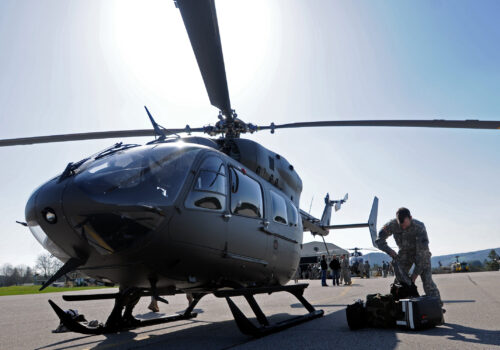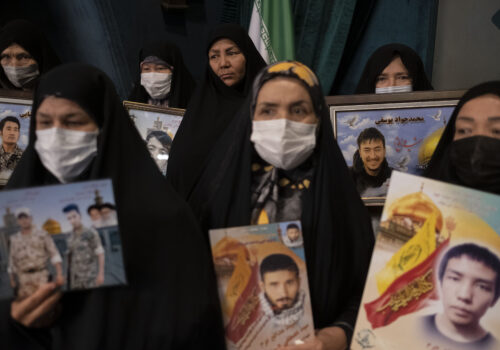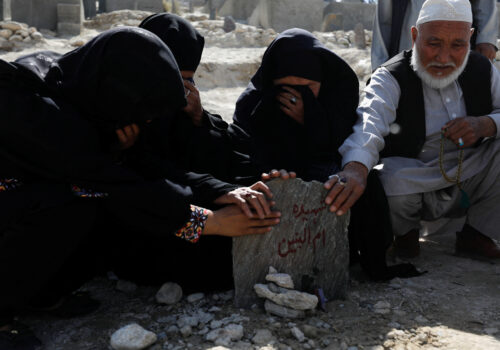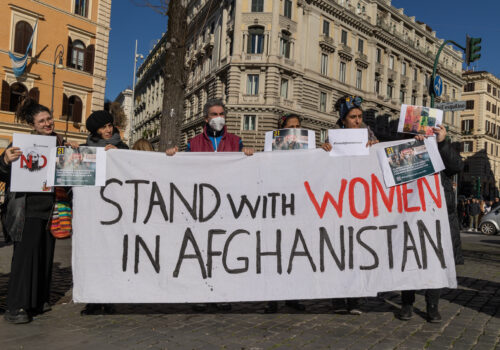After Kabul: US and allied policy options in Afghanistan
TO: National Security Community of the United States, its Allies, and Partners
FROM: The Atlantic Council and DT Institute
DATE: November 30, 2021
SUBJECT: After Kabul: US and Allied Policy Options in Afghanistan
On September 1, 2021, the Atlantic Council and DT Institute ran an expert-driven matrix wargame to: (1) explore major policy dilemmas on the horizon after the US-led coalition withdrawal; and (2) forecast state behavior and assess emerging risks in the wake of the crisis. Of note, three months later many of the insights appear to be unfolding with Afghanistan descending further into a complex humanitarian emergency, rising terrorist attacks, and no major movement on recognizing the Taliban government.
Key insights: A new fault line in global competition
Afghanistan will remain chaotic and unstable. Despite the Taliban takeover, regional competitors will likely support rival non-Taliban armed groups in Afghanistan. Intelligence agencies from around the world will broker relationships to address emerging terrorist safe havens by backing rival factions within the Taliban and armed opposition to the new government. The mix of competing interests and proxies will create a new fault line in great-power competition and sustain the current complex humanitarian emergency indefinitely.
Authoritarians will fill the vacuum. China, Russia, Iran, Pakistan, and India, as well as multiple Central Asian and Gulf states, retain interests in Afghanistan. Expect to see more money and weapons flow into Afghanistan at the expense of human rights, stability, and effective counterterrorism. China and Russia will use the threat of under-governed spaces in Afghanistan to promote rival institutions like the Shanghai Cooperation Organization as a counter to the US-led international order. Watch for China to convert key facilities like Bagram Air Base into dual-use infrastructure consistent with other Belt and Road Initiative projects.
Policy recommendations: Take an indirect approach
Counterterrorism by denial. Unilateral, over-the-horizon counterterrorism (CT) will likely prove cost-prohibitive, and there are few reliable CT partners in Afghanistan. Therefore, the United States and its partners should explore alternative mechanisms linked to transportation and border security using a mix of biometric identification as well as other passive tracking systems, counter-threat finance, and intelligence-sharing to support efforts that deny international terrorist organizations the ability to export violence from Afghanistan.
Use economics as a focal point for stability. Afghanistan’s location will likely pull India, Iran, Central Asia, and China into a series of new economic investments that connect Kabul to the world. To the extent that these projects promote trade and investment, they could provide stability, address underlying aspects of the Afghan economy that leave it prone to food insecurity as well as structurally high underemployment, and moderate the new Taliban government in Kabul. The risk is that the investments provide revenue and legitimacy to the Taliban.
How we ran the game
We conducted a matrix game with three turns (2021, 2022, 2023). Ten players—top regional experts and former senior US government officials from multiple administrations—represented the United States, China, Russia, India, Pakistan, Iran, the Central Asian states, the Arab Gulf states, NATO, and the international development community. The Taliban, Haqqani Network, AQIS, and ISIS-K were represented by a red-cell expert. The game forced each player to craft a strategy in terms of policy objectives (ends) and different instruments of power (ways) as well as state their overarching logic as a theory of victory. The white cell assessed how the strategies interacted and affected available policy options. The game was developed for Atlantic Council and DT Institute by Benjamin Jensen, the senior fellow for future war, gaming, and strategy at the Center for Strategic and International Studies.
Future dilemmas revealed during the matrix game
- Recognition is a collective action problem. Given the risks to their global reputations, no player believed their state should be first to recognize the Taliban. There was a general expectation that the first recognition would lead to additional recognitions, with select states holding out to pressure the Taliban, albeit with limited success.
- Taliban cohesion could crack. Despite recent gains, the Taliban is not monolithic and is historically prone to internal and regional divisions. The longer it takes for countries to recognize the Taliban and aid dollars to flow, the more likely the group is to splinter.
- Climate change is a regional security threat. The ongoing drought in Central Asia and shifting weather patterns in South Asia could accelerate the complex humanitarian emergency, triggering further economic collapse and creating new regional risk vectors.
- Downstream domestic political risks are likely. Migration has increasingly affected electoral debates across the globe in recent years. The propaganda campaign Russia and China will unleash to shame the West will likely spill over to European and US elections. If the complex humanitarian emergency in Afghanistan spreads to Pakistan, it could affect civil-military relations, compound domestic political instability, and create the conditions for a future coup.
Next steps
The Atlantic Council and its partners will explore conducting follow-on games to evaluate these initial insights, identify additional areas of concern, and use the combined results to publish additional insights. If you are interested in engaging with us on this series of Afghanistan-related matrix games and foresight work on the geopolitical, counterterrorism, and development concerns linked to the crisis, please contact Cameron Chisholm, executive vice president, DT Institute (Cameron.chisholm@dt-institute.org) and Barry Pavel, senior vice president and director, Atlantic Council Scowcroft Center for Strategy and Security (BPavel@atlanticcouncil.org).
Acknowledgments
This project was made possible with the generous support of DT Institute.

Related Atlantic Council content on Afghanistan

Forward Defense, housed within the Scowcroft Center for Strategy and Security, generates ideas and connects stakeholders in the defense ecosystem to promote an enduring military advantage for the United States, its allies, and partners. Our work identifies the defense strategies, capabilities, and resources the United States needs to deter and, if necessary, prevail in future conflict.
Image: Source: https://www.marines.mil/Photos/igphoto/2000950062/



